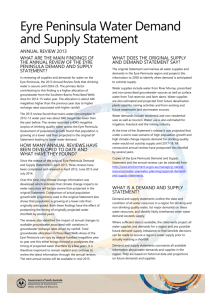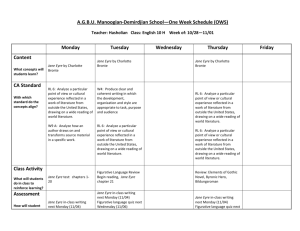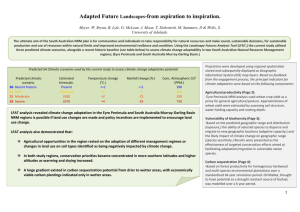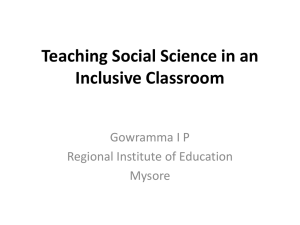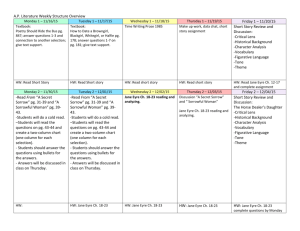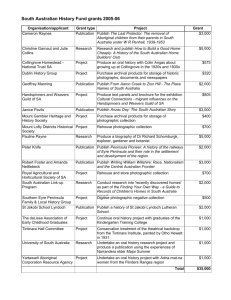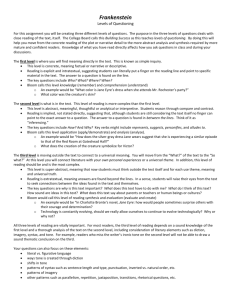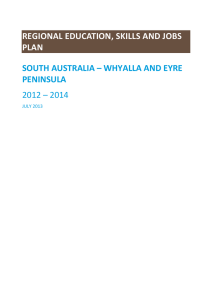Skills for Jobs in Regions REQUEST FOR TENDER Eyre REGION
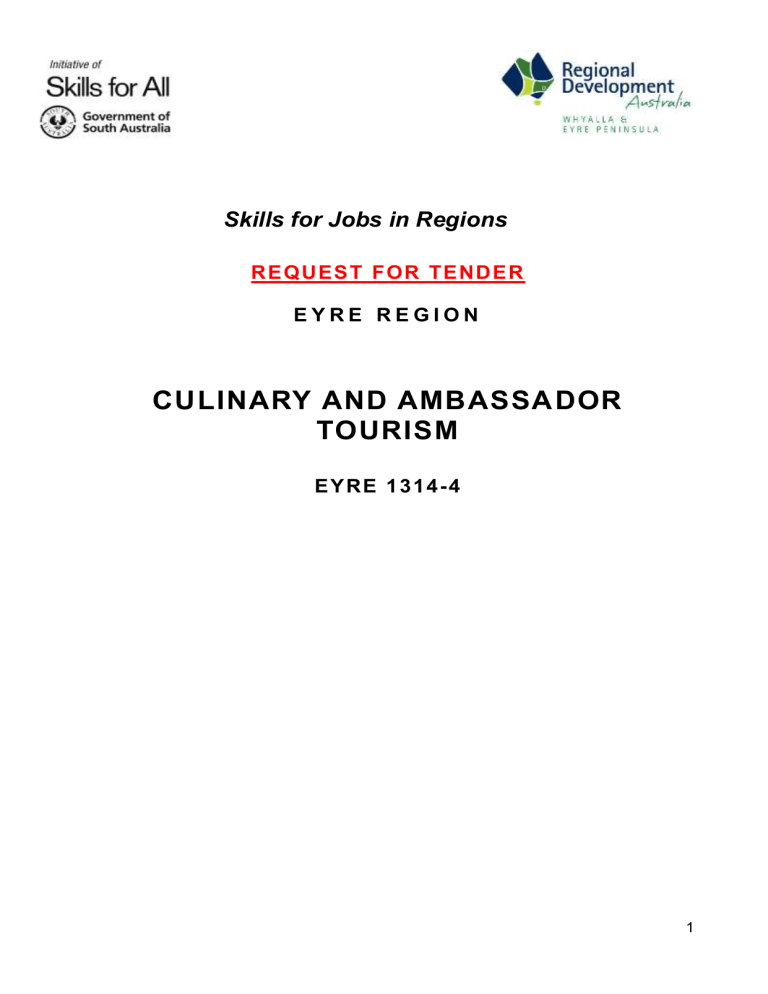
Skills for Jobs in Regions
R E Q U ES T F OR T E ND E R
E Y R E R E G I O N
CULINARY AND AMBASSA DOR
TOURISM
E Y RE 1 3 14 - 4
1
1. Background
In 2006, the Eyre Peninsula food industry launched ‘Eyre Peninsula, Australia’s
Seafood Frontier’, a co-operative marketing brand designed to position Eyre
Peninsula’s food industry as a premium region showcasing its world-class strengths: sustainability, innovation, pioneering spirit and premium food products.
To help achieve this goal there is a need to establish stronger relationships with the end users including chefs, front of house restaurant staff and retail sales staff to provide a better culinary experience for tourists. It is recognised that restaurants and cafes are often the venues where tourists seek information on the town or regions features and attractions. This has the effect of value adding in the region and with a good experience, tourists are likely to return. These are known as “Town
Ambassador” skills.
The Culinary and Ambassador Tourism project aims to assist in the attainment of practical work-related skills applicable to the tourism industry with a focus on the food sector on Eyre Peninsula. It will enable participants to gain a taste of training in the tourism and food sectors to assist them to make an informed decision about their chosen career pathway. There will also be some emphasis in ensuring participants have a sound knowledge of their local features and attractions (Town
Ambassadors), as it is well understood that staff in the food industry are “at the front line” in providing tourists with a well rounded experience. This has the effect of
There are a number of skills which are common to both sectors, therefore this project aims to provide skills easily transferrable across both industries.
2. The Partners value adding in the region and with a good experience, tourists are likely to return.
This project is a partnership between:
Regional Development Australia Whyalla and Eyre Peninsula (RDAWEP) funded by DFEEST - Skills for Jobs in Regions program
Agrifood Skills Australia Ltd on Eyre Peninsula is one of 4 regions in
Australia chosen for the roll-out of the Skills National Regional Initiatives
Regional Development Australia Whyalla and Eyre Peninsula (RDAWEP) funded by PIRSA -Regional Development Fund and the regional Food and
Tourism Industry from the “Brand Eyre Peninsula: Building A World Class
Food Region” Program.
(a) RDAWEP and Skills for Jobs in Regions
The Skills for Jobs in Regions Program engages South Australians who are disconnected from learning, training and work, in tailored workforce participation projects that respond innovatively to local skill and workforce needs by:
providing people with the skills to succeed in training and employment
providing employers with access to skilled workers at the time they need them.
2
RDAWEP’s role is to manage project funds and implementation on behalf of the project partners and to ensure that the Skills for Jobs in Regions and other partner objectives are met.
(b) Agrifood Skills Australia Ltd’s AgriFood National Regional Initiative’s with its core objectives on the Eyre Peninsula:
Retention of existing workers
Stemming outward migration of young people
Attracting new workers
Locally available skills development
Understanding skills demand (for the Eyre Region)
Becoming industries and employers of choice
Agrifoods Skills Australia Ltd’s AgriFood National Regional Initiative’s hosts a working group who will monitor and take remedial action if necessary to ensure proportionate energy is focused on delivering outcomes for its cohort in line with these core objectives.
(c) Chefs Masterclass is a component of the “Brand Eyre Peninsula: Building A
World Class Food Region” Program which is intended to provide a unique opportunity for Eyre Peninsula chefs to be mentored by Australia’s best chefs.
Invitations are to be extended to highly skilled chefs to conduct a masterclass workshop on Eyre Peninsula to stimulate, motivate and educate the Eyre
Peninsula’s leading culinary team.
Invitations are to be extended to selected participants to observe and learn from some of the best chefs in the country.
3. Participants and Target Groups
This project will engage 100 participants (nominal) over 5 Tourism Sub Regions with a focus on the following three Target Groups:
Target Group (a)
– Skills for Jobs in Regions, Individuals who are out of school and out of work who may not be connected to, or have insufficient funds allocated through their Jobs Services Australia provider. People in this group may be currently under employed or unemployed, or at risk of losing employment
– 15 minimum (from the following Target Groups – Skills for Jobs in Regions)
Age Group
Anticipated Participant
Numbers
11
Target Group Participants
(Totals Only)
A D CALD
People aged
16-24
People aged
25-44
People aged
45-59
3
1
2
People aged
60+
Total 15
3
Key A = Aboriginal people; D - People with disability; CALD
– Culturally and
Linguistically Diverse
NB, for Target Group (a), Individuals shall be case managed and provided with tickets and/or licences where applicable. Records of this service must be recorded.
Target Group (b)
– Individuals who are currently employed as apprentice or trainee chefs (Back of House), ie Apprentice/Trainee Chefs – 10 (2 from each sub region, nominal)
Target Group (c) – Individuals who are currently employed in the retail/hospitality sector, (Front of House), ie Customer Service – 75 participants, (15 from each sub region, nominal)
NB, for all Target Groups, project proposals must aim to achieve as a minimum the following Skills for Jobs in Regions outcomes:
Also refer to Annexures 1, 2 and 3.
Project outcomes
Number of participants
Employment outcomes 4
Skills for All outcomes 6
Other Pathway outcomes 3
4. Project Scope
Tenderers are required to provide a draft schedule and budget for a program of project delivery as follows:
Delivery across the following five sub regions:
Lower Eyre Peninsula
West Coast
Far West Coast and Nullarbor
Central Eyre and Gawler Ranges
Eastern Eyre
Project content for each region over 5 consecutive weeks (nominal) over two days per week as tabled below (parts 1, 2a, 2b and 2c). This is to be followed by the
Chef Masterclass component (part 3) as soon as practicable thereafter and nominally in March 2014.
4
Component
Number
1
2a
Schedule and
Participants
Day 1 (All participants)
Day 2 (Front of
House Participants and selected Skills for Jobs in
Regions
Participants)
Program
Town Ambassador – a guided bus tour of the sub region with commentary from local industry leaders
AussieHost –
Tourism/Hospitality refer to Annexure 4.
To be held at a suitable venue within the sub region
Outcomes
To assist in the attainment of practical work-related skills applicable to the tourism industry with a focus on the food sector on Eyre
Peninsula. It will enable participants to gain a taste of training in tourism and food sectors. There will also be some emphasis in ensuring participants have a sound knowledge of their local features and attractions (Town
Ambassadors), as it is well understood that staff in the food industry are “at the front line” in providing tourists with a well rounded experience.
This has the effect of value adding in the region and with a good experience, tourists are likely to return.
An understanding that the customer is the lifeblood of the company.
How to communicate effectively, avoid assumptions and change customer perceptions for the better.
How to give the customer a quality experience and demonstrate how that benefits everybody.
How to meet, greet and remember
5
Component
Number
2b
Schedule and
Participants
Program Outcomes
Day 2 (Back of
House Participants and selected Skills for Jobs in
Regions
Participants)
Eyre Peninsula Chef
Master Class – a series of hands on workshops with EP leading chefs teaching back of house participants skills to work with local seafood. names and faces.
How to listen actively and ask open questions.
How to handle complaining customers and solve service related problems.
Selected components from:
Follow Health,
Safety and
Security
Procedures
Follow Workplace
Hygiene
Procedures
Verbal communication
Work with
Colleagues and
Customers
Communicate on the telephone
Provide Food &
Beverage Service
Organise and
Prepare Food
Operate a Bar
Provide
Responsible
Service of Alcohol
Clean and Maintain
Kitchen Premises
Presentation for work
Process Financial
Transactions
(POS, Till)
Receive and Store
Kitchen Supplies
Teamwork
Problem solving
Liquor Licencing
Laws of SA
Prepare and Serve
Espresso Coffee
Provide responsible
6
Component
Number
2c
3
4
Schedule and
Participants
Program Outcomes
Day 2 evening (All
Participants)
March 2014
(Senior and
Experienced
Chefs, selected
Back of House
Participants and
Selected other
Participants)
Additional later training (Selected
Presentation event and networking dinner, to be held at a suitable venue within the sub region gaming services
Non-verbal communication
Cash handling
Develop and
Update Hospitality
Industry
Knowledge
Promote products and services to customers
Provide
Accommodation
Reception Services
Clean and Tidy Bar
Area
Provide Link between Kitchen &
Service Area
Prepare Rooms for
Guests
Present Food
Use Basic Methods in Cookery
Clean Premises and Equipment
NB: some of these components will only be alluded to as options for later additional training, part 4.
Experience local product and hear about local tourism attractions presented by sub regional locals.
Chefs Masterclass
Certificate III in
Commercial Cookery
Highly skilled chefs will conduct a masterclass workshop on Eyre Peninsula to stimulate, motivate and educate the Eyre
Peninsula’s leading culinary team.
To be determined
7
Component
Number
Schedule and
Participants
Participants) Not part of this
Project Brief
Program or similar
5. Table A - ‘Key Project Milestones and Payments’
Outcomes
RDAWEP, as the Grantee for the Skills for Jobs in Regions program, is seeking a provider/coordinator to deliver the Culinary and Ambassador Tourism Project in the
Eyre Region.
Skills for Jobs in Regions Funding available for this project: $64,000
Milestone Date
Budget accepted,
Submission of a Project
Commencement Form and Signing of this Letter of Offer plus a tax invoice
Submission of Participant
Commencement Forms plus a tax invoice
January 15 th 2014
February 28 th 2014
Amount
GST not included
40% of budget
20% of budget
At completion of Day 2 program plus a tax invoice
March 31 st 2014 20% of budget
At completion of Chef’s
Masterclass, Submission of Participant Exit Forms,
Project Completion Form plus a tax invoice
6. Reporting requirements
Not later than 30 th April
2014
20% of budget
As listed in table A
7. Insurance
The successful application will be required to provide evidence of insurance policies that meet the following:
Public Liability – Twenty Million Dollars ($20,000,000)
Professional Indemnity – Ten Million Dollars ($10,000,000)
8
8. Subcontracting
Applicants are required to identify any providers they intend to subcontract elements of the project to. If these details are not known and the applicant is successful they will need to seek the approval of the RDAWEP prior to engaging a provider to deliver proposed elements.
9. Monitoring and Evaluation
Applicants are required to identify how they intend to monitor and track the project in order to achieve outcomes and objectives, and meet reporting requirements.
Applicants should identify in their application what process and strategies are in place that will support this requirement.
In addition, the successful applicant will be required to participate in:
At least one of the Skills for Jobs in Regions Network meetings and evaluation activities, as advised
10. Risk Management
Applicants will need to identify potential risks and how they will be mitigated. A template has been provided in the application for completion (see annexure 5 or download template from www.eyreregion.com.au
). Consider the risks that may occur during the life of the project in relation to funding, personnel, delivery schedule, project scope, quality of delivery and outcomes, participant recruitment, promotion and marketing, stakeholder engagement, partnerships, reporting and transitioning participants into employment or a training pathway.
11. Child Protection
The successful applicant will be required to provide evidence of the following for any personnel involved in the project who may come into contact with participants under the age of 18 years of age:
Training in mandatory reporting has been undertaken
A satisfactory police clearance has been obtaining from the Commissioner of Police.
12. Application Process
Applications may be in your preferred format, however applications MUST address the project criteria
Applications MUST be submitted to the RDAWEP office, 89 Liverpool
Street, Port Lincoln by 5:00 pm, Friday 10 th January 2014
Contact person for questions and further information – Peter Mitchell
86826588
9
13. Decision Making Process
All Funding Applications will be assessed on their merits by the Program Assessment
Panel which consists of:
NAME Position Organisation
Peter Mitchell
Tim Coote and or
Ivan Phillips
Tanya Harris
Anne-Marie
Hammond
Sue Henrickson
Representative of the Grantee (EO)
Skills for All Regional Manager and or
Aboriginal Participation Coordinator
Senior Project Officer
RDAWEP
DFEEST
DFEEST
Skills for All Regional Network representative
(not a Subcontractor)
Independent
Administrative Support Officer/Minute Taker RDAWEP
The Project Assessment Panel will assess applications against the project criteria.
RDAWEP will make the final decision based on the recommendations from the
Project Assessment Panel. All decisions about successful applications are confidential and final.
Applicants will be notified asap of the outcome and how successful/unsuccessful applicants will be notified.
10
ANNEXURE 1
Skills for Jobs in Regions
Priority Groups
To align with Skills for Jobs and the State’s broader strategic context of delivering skilled people who are fully participating in the South Australian workforce, the Skills for Jobs in
Regions program will fund projects that support:
1. People not in the labour force, but who want to work (not currently registered with a
JSA/Centrelink
2. People who are in the labour force, but who want to work more (underemployed)
3. People displaced through industry restructuring and who need help to access skill development, training or employment opportunities. This support will, wherever possible match skill development with the workforce needs of group industry sectors.
4. People who left school with low educational attainment and have not subsequently achieve a non-school qualification, particularly those with no or low foundation skills.
5. Unemployed people. This can include Job Services Australia (JSA) Streams 1 and
2 clients, where projects demonstrably address a gap in services provided through
JSA providers (or DES providers for people with a disability), with evidence.
6. Long-term unemployed people (JSA Streams 3 and 4), where project design demonstrably addresses a gap in services through JSA providers (or DES providers for people with a disability), with evidence.
7. People who have successfully completed a Skills for Jobs funded qualification including those who have accessed Learning Support Services and need assistance to transition into an identified employment commitment by an employer.
Participant Eligibility
Eligibility criteria apply to the following people:
Young people enrolled in school cannot access Skills for Jobs in Regions funded projects and services unless approved by the Department of Further Education,
Employment, Science and Technology (DFEEST). Out of school training for school students must be accredited and accessed through the Training Guarantee for
SACE students.
Young people completing their final year of school and transitioning into further education or work can access DFEEST Career Services with their school career counsellor on a fee-for-service basis.
Job Service Australia Stream 3 and 4 Clients are eligible to participate on a Skills for Jobs in Regions project if there is a clearly identified and evidenced gap in service provision or a financial contribution is leveraged based on an individual fee for service arrangement.
Disability Employment Services (DES) clients are eligible for a Skills for Jobs in
Regions project if there is a clearly identified and evidenced gap in service provision or a financial contribution is leveraged base on an individual fee for service arrangement.
Employed people are not eligible for a Skills for Jobs in Regions project unless they are underemployed or facing retrenching/redundancy.
11
ANNEXURE 2
Skills for Jobs in Regions
Project Components
Project
Component/s
Non-accredited
Training
Accredited
Training: Skill Set or Skill Cluster
Structured
Mentoring
Individual Case
Management
Description
Learner centric training delivered over a scheduled time frame. It is planned and uses a range of teaching/learning activities and maps to a quality framework.
Providers of non-accredited training should be a:
listed Skills for Jobs training provider/ or in the process of becoming listed; or
listed Adult Community Education (ACE) provider/ or in the process of becoming listed; or
Registered Training Organisation (RTO)
If non-accredited training is intended to be delivered by a provider who doesn’t meet this criteria complete Annexure 2 of the Project
Application.
Skill Sets: a core group of competencies from training package qualifications; they meet a national industry specific licensing or regulatory requirement or other industry need. They must be a nationally recognised Skill Set as listed on the www.training.gov.au
website.
Skill Cluster: a number of competencies drawn from different accredited courses grouped together, which have a vocational meaning and purpose related to work functions and needs in an industry or enterprise.
Skill Sets and Skill Clusters are:
Employer driven
Do not duplicate existing Skill Sets
Have a clear link between training and job opportunities
Are generally identified as employment pathway projects.
Listed Skills for Jobs training providers should be used as a priority for all accredited training where possible.
A mutually agreed upon relationship between individual learners and paid/trained mentors. The relationship will often be expressed formally through a contract, job and person specification, induction process.
Mentors should be appropriately training, have participated in induction and be able to demonstrate clear deliverables.
Individualised support and referral, provided in a whole of life context that addresses barriers faced by people in relation to their engagement in learning, training and work. The service is delivered by case managers facilitating a seamless approach to supporting people into VET or moving people from VET, underemployment or unemployment into work.
Individual Case Management providers must be qualified in case management or if not, formally qualified, have a qualifications in related/relevant disciplines and with sufficient experience to be able to provide evidence of previous quality service delivery.
12
Project
Component/s
Tickets and
Licenses
Description
Allow participants to access employment opportunities in areas bound by legislation and/or regulation requirements. Projects delivering tickets and license should be blended with other project components or delivered in partnership with industry/employers to increase successful employment transition.
13
ANNEXURE 3
Skills for Jobs in Regions
Pathway Outcome Definitions
Pathway Outcome
Skills for Jobs
Further education
Work experience
Volunteering
Achieved when a participant: accesses or intends to access their Skills for Jobs entitlement post project. It does not include participants being supported to access their Skills for Jobs entitlement as part of a Skills for
Jobs in Regions project.
Commences or intends to enrol in:
Adult Community Education
A non-accredited course with a vocational intent/focus
Vocational Education and Training (VET)
Higher education (Diploma and above)
It does not include participants being supported to undertake further education as part of a Skills for Jobs in Regions project. has commenced or intends to engage in a work experience placement post project . It does not include participants who undertake work experience as part of the Skills for Jobs in
Regions project. commences or intends to commence volunteering post project .
It does not include participants undertaking volunteering as part of the Skills for Jobs in Regions project. has enrolled in school or intends to enrol in school post project.
Returned to school
14
Short Description
ANNEXURE 4
AussieHost – Tourism/Hospitality
AussieHost is a nationally recognised customer service training program that focuses on interpersonal communications, customer relations and service applicable to a wide range of customer service businesses and sectors.
Duration 1 Day
Who Should Attend All staff who have recently entered customer service positions and who have not attended any other customer service training.
The program is also suitable for any person involved in Customer
Service but is yet to have the opportunity of participating in a course that demonstrates the essential customer service concepts.
Pre-requisites
Key Subject Areas
There are no pre-requisites for this program.
What is customer service excellence?
Workplace and personal presentation
Excelling in communication skills
Effective telephone communication
Handling customer complaints and dissatisfaction
Who is your customer?
Learning Outcomes Understand that the customer is the lifeblood of the company
Communicate effectively
Avoid assumptions and change customer perceptions for the better
Give the customer a quality experience and demonstrate how that benefits everybody
Meet, greet and remember names and faces
Listen actively and ask open questions
Handle complaining customers and solve service related problems
Certification Following successful completion of the AussieHost Customer
Service Fundamentals workshop, participants will receive an internationally recognised AussieHost certificate. This AussieHost workshop has been mapped against the relevant units from
SIR07/SIT07.
Each participant will receive a 56 page workbook. Materials Supplied
Presentation Method Facilitator-led with highly interactive material, including power point examples, exercises and discussion.
15
ANNEXURE 5
Risk Management Matrix
Please complete the table and identify any potential project risks and how you will deal with them.
Type of Risk
Project contract risk
Risk Mitigation Scenario
Example: Lack of participants interested in your program
Example: Injury of participant using hand tool incorrectly
HS&W
16
